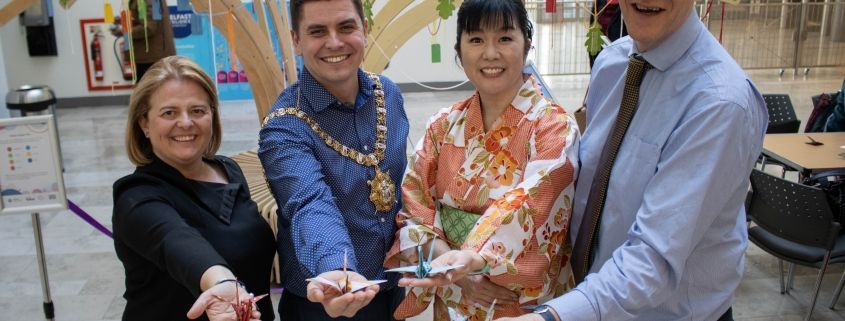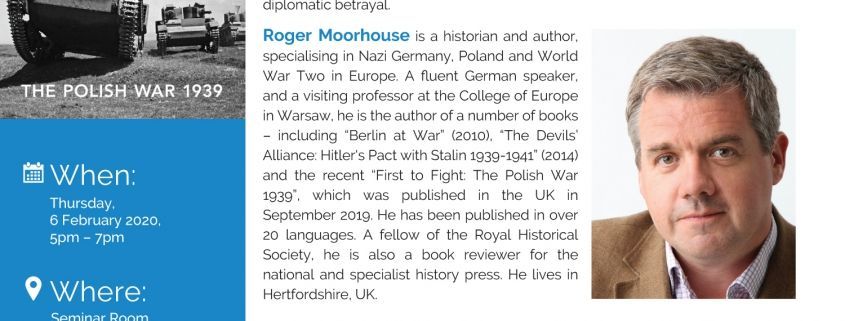Archive for year: 2020
Belfast Lord Mayor launches ‘One Thousand Paper Cranes’ Project
/in News /by adminBelfast Lord Mayor Cllr Daniel Baker has launched the ‘One Thousand Paper Cranes’ project at Ulster University, Belfast.
The project, developed by the Centre for Democracy and Peace Building in partnership with Ulster University and Craic NI, celebrates diversity, culture of peace and links between Northern Ireland and Japan.
Thanks to the support from the Community Relations Council, several community arts workshops will be hosted across Northern Ireland to make 1000 origami paper cranes with messages of lasting peace.
Eva Grosman, CEO, Centre for Democracy and Peace Building said:
“There is an old Japanese belief that anyone who folds a thousand origami cranes will see their wish come true. Our wish is a hate free Northern Ireland and a hate free world.”
“Approximately 10 million cranes from all across the globe are offered each year before the Children’s Peace Monument in Hiroshima.”
“This year, as we mark the 75th anniversary of the bombing of Hiroshima we will also present 1000 origami cranes from Northern Ireland.”
Lord Mayor of Belfast, Councillor Daniel Baker said:
“I’m delighted to support Ulster University and the Centre for Democracy and Peace Building in their One Thousand Paper Cranes initiative. A symbol of hope and longevity, the crane is an international symbol of peace and we’re all here to symbolise our shared wish for a hate free country and a hate free world.
“As we poignantly mark the 75th anniversary of the Hiroshima bombing this year, we also remember the great friendship this land shares with Japan. Belfast is a member of the ‘Mayors for Peace’ initiative set up in 1982 by the Mayor of Hiroshima and we continue to celebrate our mutual desire for a peaceful society.”
Professor Duncan Morrow, Director of Community Engagement at Ulster University added:
“We are thrilled to host the launch of the One Thousand Paper Cranes project on our Belfast campus. Ulster University is recognised as a global leader in peace and reconciliation research and this creative project will bring communities together for a common purpose and facilitate important discussions on diversity, peace and reconciliation.”
“As part of the project, our Visiting Professor in Immersive Futures and diversity and inclusion specialist Deepa Mann-Kler will create an artistic intervention using Augmented Reality to explore peace building in digital and physical spaces of Belfast and Hiroshima.”
Next month the project will be launched in Japan House London to celebrate cultural and business links between Japan and Northern Ireland.
One Thousand Paper Cranes
/in News /by Eva GrosmanThanks to the support from the Community Relations Council we are launching One Thousand Paper Cranes project to celebrate culture of peace and to engage with diverse communities in Northern Ireland and beyond.
The first community workshop, organised in partnership with Craic NI will take place on 26 February at Ulster University.
One Thousand Paper Cranes
Wednesday, 26 Feb | 3pm – 5pm
Ulster University
York Street
Belfast BT15 1ED
The crane has long been a symbol of hope and longevity, and an international symbol of peace. There is also an old Japanese belief that anyone who folds a thousand origami cranes will see their wish come true…
Our ultimate wish is a hate free Northern Ireland. And a hate free world. A peaceful, prosperous and reconciled society at ease with itself. So, please join in and help us to make 1000 paper cranes!
Join us for the One Thousand Paper Cranes workshop to:
Learn the art of Japanese paper folding
Learn about the incredible story behind One Thousand Paper Cranes
Learn about diversity and peacebuilding
Help us to make 1000 paper cranes and see our wish come true
Register at: www.getinvited.to/cdpb/tsuruwww.getinvited.to/cdpb/tsuruwww.getinvited.to/cdpb/tsuru
In addition, we are working with an artist, Visiting Professor in Immersive Futures at Ulster University and diversity & inclusion specialist Deepa Mann-Kler to create an artistic intervention through the augmented reality (AR) tool using geospatial markers, to explore peace building in digital spaces and physical spaces of Belfast and Hiroshima.
More information to follow.
Talk by Roger Moorhouse: First to Fight
/in News /by Eva GrosmanFirst to Fight is the first history of the Polish war for almost half a century. Drawing on letters, memoirs and diaries by generals and politicians, soldiers and civilians from all sides, Roger Moorhouse’s dramatic account of the military events is entwined with a tragic human story of courage and suffering, and a dark tale of diplomatic betrayal.
Roger Moorhouse is a historian and author, specialising in Nazi Germany, Poland and World War Two in Europe. A fluent German speaker, and a visiting professor at the College of Europe in Warsaw, he is the author of a number of books – including “Berlin at War” (2010), “The Devils’ Alliance: Hitler’s Pact with Stalin 1939-1941” (2014) and the recent “First to Fight: The Polish War 1939”, which was published in the UK in September 2019. He has been published in over 20 languages. A fellow of the Royal Historical Society, he is also a book reviewer for the national and specialist history press. He lives in Hertfordshire, UK.
The event will be chaired by Professor Norman Davies FBA.
Thursday, 6 February 2020 | 5pm – 7pm
Seminar Room
The European Studies Centre
St. Antony’s College, University of Oxford
70 Woodstock Road
Oxford OX2 6HR
Register at: https://getinvited.to/cdpb/moorhouse/https://getinvited.to/cdpb/moorhouse/https://getinvited.to/cdpb/moorhouse/
The event supported by The Polish Cultural Institute in London will be hosted by the European Studies Centre, St. Antony’s College, University of Oxford. Organised by the Centre for Democracy and Peace Building in partnership with the Oxford Polish Association.
_____________
“[A] chilling, indignant narrative… Moorhouse has expertly laid bare…[the] truth” (Roger Boyes The Times)
“Moorhouse’s book remedies that gap [in history of The Polish War], weaving together archival material, first-hand accounts, perceptive analysis and heartbreaking descriptions of Poland’s betrayal, defeat and dismemberment” (Economist)
“[A] fascinating book… Moorhouse has mastered a large body of material… this is…a very valuable book, as it gathers a mass of detail into a lucid narrative for general readers” (Noel Malcolm Sunday Telegraph)
“An important book. Roger Moorhouse has a wonderful knack of reminding us about the parts of the Second World War that we are in danger of forgetting” (Dan Snow)




